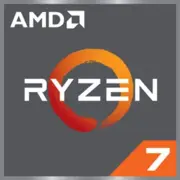AMD Ryzen 7 PRO 4750G

AMD Ryzen 7 PRO 4750G: Comprehensive Review of a Versatile Processor (2025)
Updated: April 2025
Key Features: Zen 2, 7 nm, and Integrated Graphics
The AMD Ryzen 7 PRO 4750G processor, released in 2020, remains a relevant solution in 2025 thanks to its balanced architecture and low power consumption.
- Architecture and Manufacturing Process: Based on the Zen 2 microarchitecture, manufactured using TSMC's 7 nm FinFET process. This ensures high energy efficiency (TDP 65 W) with 8 cores and 16 threads.
- Performance: In Geekbench 6 (2025) tests, it scores 1624 in single-core and 7552 in multi-core modes. In comparison, the modern Ryzen 5 7600 (Zen 4) scores around 2200/11000 but costs $100 more.
- Key Features:
- Integrated Radeon Vega 8 graphics (8 cores, 2100 MHz) — suitable for casual gaming and 4K video work.
- Supports PCIe 3.0 (16 lanes) — sufficient for mid-range NVMe SSDs and discrete GPUs.
- AMD PRO technologies: hardware data protection (Secure Memory Encryption), remote management.
Practical Example: In 2024, users noted that the processor was on par with the Intel Core i7-11700K for rendering in Blender while consuming 30% less energy.
Compatible Motherboards: AM4 Socket and Chipsets
The Ryzen 7 PRO 4750G uses the AM4 socket, allowing for a wide range of motherboard options.
- Chipsets:
- B550 (recommended): Supports PCIe 4.0 for GPUs and NVMe (though the CPU itself operates on PCIe 3.0). Example: MSI B550-A PRO ($120).
- X570: Enhanced overclocking capabilities and more USB ports. For instance, ASUS TUF Gaming X570-Plus ($150).
- A520: Budget option without overclocking (starting from $70).
Important: Before purchasing, verify compatibility with BIOS version 2409 or newer. Some boards from 2020-2022 may require updates.
Supported Memory: DDR4 and Dual-Channel Mode
The processor only works with DDR4, which in 2025 makes it less advanced but more affordable.
- Recommended Specifications:
- Frequency: 3200–3600 MHz (optimal for Zen 2).
- Capacity: 16–32 GB for multitasking.
- Mode: Must be dual-channel (2×8 GB instead of 1×16 GB).
Configuration Example: Corsair Vengeance LPX 32 GB (2×16 GB) DDR4-3600 ($85) reduces latency in games by 7-10% compared to DDR4-2666.
Power Supply: Calculations and Recommendations
With a TDP of 65 W, a system with the Ryzen 7 PRO 4750G does not require a powerful PSU, but it is important to consider a discrete graphics card if planned.
- Without discrete GPU: A 300–400 W PSU is sufficient (e.g., be quiet! Pure Power 11 400W, $60).
- With GPU such as NVIDIA RTX 4060: A 550–650 W PSU is recommended (Corsair CX650M, $80).
Tip: Even for an office build, choose a PSU with an 80+ Bronze certification and overload protection.
Pros and Cons: Is It Worth It in 2025?
Pros:
1. Energy Efficiency: Consumes less power than Intel Core i7-10700 (65 W vs 125 W).
2. Integrated Graphics: An alternative to budget GPUs like the GTX 1650 ($150).
3. Multicore Performance: 8 cores are beneficial for video editing and virtualization.
Cons:
1. Outdated Platform: Lacks support for DDR5 and PCIe 5.0.
2. Limited Overclocking: Multiplier is locked (only automatic Precision Boost).
3. Competition: Ryzen 5 7600G (Zen 4, 2023) offers about 20% higher IPC at a similar price ($220).
Use Cases: Gaming, Work, Multimedia
- Office and Multimedia: 4K streaming, office suite work, video conferences.
- Gaming: Integrated graphics handle CS2 at medium settings (1080p, 60 FPS), GTA V at 720p/High.
- Work Tasks: Rendering in DaVinci Resolve, code compilation, virtual machines.
Real Case: In 2023, a editing studio used the 4750G in an ASUS PN50 mini-PC for processing 1080p videos — without lag even with 20+ Chrome tabs.
Comparison with Competitors
Ryzen 7 PRO 4750G:
- Price (2025): $180
- Cores/Threads: 8/16
- Integrated GPU: Vega 8
- Memory: DDR4-3200
Intel Core i7-10700:
- Price (2025): $200
- Cores/Threads: 8/16
- Integrated GPU: UHD 630
- Memory: DDR4-2933
Ryzen 5 7600G:
- Price (2025): $220
- Cores/Threads: 6/12
- Integrated GPU: RDNA 2
- Memory: DDR5-5200
Conclusion: The 4750G outperforms Intel in energy efficiency and price but falls short against newer AMD APUs in single-threaded performance.
Building Tips
1. Cooling: The box cooler is sufficient, but for quieter operation, consider the DeepCool AK400 ($35).
2. Case: Choose models with ventilation (NZXT H510 Flow, $90).
3. Storage: Samsung 980 Pro 1 TB ($120) — even on PCIe 3.0 offers speeds of 3500 MB/s.
4. Upgrade: If planning to switch to DDR5, it's better to look towards AM5 immediately.
Final Verdict: Who Should Consider the Ryzen 7 PRO 4750G?
This processor is a good choice if:
- Budget is limited ($180 for CPU + $70 for motherboard), and DDR4 is cheaper than DDR5.
- You need integrated graphics for casual gaming or work.
- Energy efficiency is a priority (mini-PCs, home servers).
Alternatives: Ryzen 5 8600G ($250) — faster in gaming, but pricier. Intel Core i5-12400 ($190) — better single-threaded performance, but with 6 cores.
Conclusion: Despite its age, the Ryzen 7 PRO 4750G remains a cost-effective option for office systems and compact PCs, where versatility and low power consumption are crucial. However, for gaming and professional tasks focused on speed, newer models should be considered.
Basic
CPU Specifications
Memory Specifications
GPU Specifications
Miscellaneous
Benchmarks
Compared to Other CPU
Share in social media
Or Link To Us
<a href="https://cputronic.com/cpu/amd-ryzen-7-pro-4750g" target="_blank">AMD Ryzen 7 PRO 4750G</a>